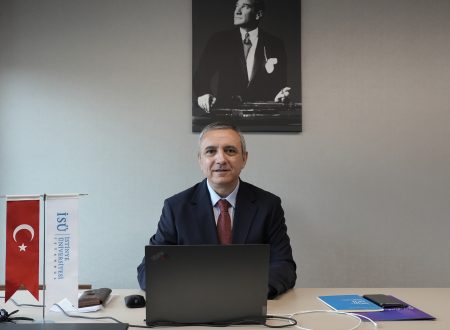October 10 is recognized worldwide as World Mental Health Day, drawing attention to the importance of mental well-being. Following the pandemic, the use of antidepressants has risen significantly. According to Prof. Dr. Ebru Şalcıoğlu, faculty member of the Department of Psychology at Istinye University, the use of antidepressants in Türkiye has nearly doubled in the last decade. Noting that today six out of every 100 people use antidepressants, Şalcıoğlu stated, “This sharp rise in antidepressant use reflects the collective strain experienced by society.”
Each year on October 10, World Mental Health Day serves as an important reminder of the growing need to protect and promote psychological well-being. On this occasion, Prof. Dr. Şalcıoğlu evaluated the current state of mental health in Türkiye and shared recent data.
Antidepressant Use Has Nearly Doubled in the Last Decade
Prof. Dr. Şalcıoğlu emphasized that antidepressant use in Türkiye has almost doubled in the past ten years:
“In the early 2010s, about three in every 100 people regularly used antidepressants; today this figure is close to six. The increase accelerated during the pandemic: in the two years following 2020 alone, approximately 10 million more boxes of antidepressants were placed on the market. These figures not only reflect a rise in mental health problems but also point to the social conditions and disparities in access to mental health care.”
70 Percent of Antidepressant Users Are Women
Highlighting a striking gender difference, Prof. Dr. Şalcıoğlu noted:
“Around 70 percent of prescriptions are written for women — meaning that seven out of ten people using antidepressants are women. Whether this gap stems from women developing more mental health problems or simply being more open to seeking treatment than men remains debated. In terms of age, individuals over 35 are more prominent, particularly those aged 36–50. However, recent years have shown an increase among younger people as well, suggesting that youth are increasingly at risk of mental health challenges.
Regional differences are also noteworthy: usage rates are higher in large cities. In some provinces — especially in western and central Anatolia — per-capita antidepressant use can be up to twice that of other regions. The challenges of urban life appear to be a key contributing factor.”
“Many People Have Access to Prescriptions, But Not to Therapy”
Explaining the factors behind this rise, Prof. Dr. Şalcıoğlu said:
“Mental health problems are increasing both in Türkiye and worldwide. In the post-pandemic period, social conditions such as economic crisis, unemployment, uncertainty, migration, and natural disasters have made psychological issues like anxiety, hopelessness, and depression more visible — particularly in Türkiye.
On one hand, the increase in antidepressant use may reflect growing mental-health awareness, the weakening of stigma, and greater willingness to seek help. On the other hand, there are systemic limitations: in time-restricted outpatient visits, prescribing medication often becomes the quickest form of intervention. As a result, many people gain access to prescriptions rather than therapy.
Since some antidepressants can be obtained without a prescription, self-medication and unsupervised continuation of treatment have become common, suggesting that the real level of use may exceed official statistics. While medication is more accessible, research shows that scientifically grounded psychotherapies — particularly cognitive-behavioral therapy (CBT) — offer more sustainable and lasting solutions. Unfortunately, financial and structural barriers limit public access to such evidence-based treatments.
The influence of the pharmaceutical industry also cannot be ignored. Framing psychological problems solely as biological or chemical disorders (medicalization) facilitates the widespread prescription of antidepressants. While medication can be beneficial and necessary in some cases, it must be evaluated by considering individual differences, side effects, and alternative interventions.”
Per-Capita Antidepressant Use Rose by 25 Percent in Two Years
Referring to a noticeable increase after the pandemic, Prof. Dr. Şalcıoğlu stated:
“Per-capita antidepressant consumption rose by about 25 percent in just two years. However, during the same period, the number of psychiatric prescriptions decreased — indicating that many people began taking medication on their own, without consulting a doctor.
Globally, the rate of self-medication during the pandemic exceeded 48 percent. The rise in medication use was driven by factors such as isolation and uncertainty due to lockdowns, fear of infection, bereavement, economic hardship, and unemployment. Increased domestic conflicts, the growing care burden on women, and weakened social support systems also deepened this situation. The surge in antidepressant use reflects the collective strain and psychological toll of these societal challenges.”
Antidepressant Use in Türkiye Remains Below European Averages
Evaluating Türkiye’s data in a global context, Prof. Dr. Şalcıoğlu explained:
“Although antidepressant use in Türkiye is increasing, it remains below that of many European countries. According to OECD data, Türkiye is among the member states with the lowest antidepressant consumption. For instance, in countries such as Iceland, Portugal, the United Kingdom, and Germany, per-capita antidepressant use is three to four times higher than in Türkiye.
However, this does not necessarily mean the Turkish population is mentally healthier; it may reflect limited access to psychotherapy and psychiatric services. In many Western countries, psychotherapy is more widespread and accessible, so people are not as reliant on medication alone. Therefore, lower rates do not always indicate a more positive picture.”
The Risks of Unnecessary or Improper Use
Discussing treatment duration and dosage, Prof. Dr. Şalcıoğlu said:
“Currently, there are no reliable data in Türkiye on the average duration or dosage of antidepressant use. Clinical guidelines generally recommend a minimum of six months, but this varies by case. Many individuals exceed this period and continue taking medication for years. More detailed field research is needed to fully understand antidepressant use patterns.”
She warned that unnecessary or improper use carries serious risks:
“Antidepressants can cause significant side effects when misused or overused — including sleep disturbances, weight changes, sexual dysfunction, and gastrointestinal problems. Some medications may lead to withdrawal symptoms when abruptly discontinued. Prolonged and unsupervised use can artificially alter the brain’s chemical balance.
Psychologically, the main risk is weakened emotional resilience and coping capacity; individuals may develop a tendency to turn to medication whenever they face difficulties, delaying more lasting solutions such as psychotherapy or life adjustments. At a societal level, this strengthens a ‘quick-fix’ culture and reinforces a health system dependent on medication, making underlying socio-economic causes less visible. Therefore, antidepressants are most beneficial when prescribed with accurate diagnosis, regular follow-up, and, when necessary, in combination with psychotherapy.”
“Mental Health Services Should Be Supported by Psychotherapy”
Concluding her remarks, Prof. Dr. Şalcıoğlu emphasized the importance of preventive and structural measures:
“We must view mental health not only as an individual matter but also as a public well-being issue, which requires structural solutions. Preventive actions are crucial: implementing emotional literacy programs in schools, developing community-based projects that strengthen social bonds, and addressing economic insecurity not only enhance individual resilience but also improve the overall mental health of society.
Türkiye’s more than 100,000 psychology graduates represent a valuable resource. Psychologists trained in evidence-based psychotherapy approaches can play active roles in awareness and early-intervention programs, contributing significantly to community mental health.
When problems do arise, we must strengthen intervention capacity. Short-term, medication-based solutions alone cannot ensure lasting well-being. Mental-health services need to be supported by scientifically proven psychotherapies. Integrating evidence-based psychotherapy into the healthcare system and training professionals in psychological intervention are critical steps toward shifting Türkiye’s mental-health services from a medication-focused model to one centered on recovery and long-term wellness.”







